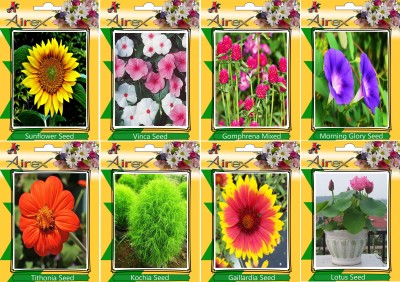Airex Sunflower, Vinca, Gomphrena Mixed, Morning Gory, Tithonia, Kochia, Gaillardia, and Lotus Seed(20 per packet)
Quick Overview
Product Price Comparison
1. Put soil into the cups or containers. 2. Add a little water. 3. Put the cups in a sunny spot. (A sunny window should work if it isnŌĆÖt quite growing season in your area. Check the seed packet for information. 4. WAIT. Growing takes time. Check the cups regularlyŌĆöevery day or every other day. Water the plants if the soil is dry. 5. One day you will see that the seeds have sprouted, and the plants are coming out of the soil. Be sure to record what the plants look like now. Write down the date. Talk with children about how many days you waited between planting the seed and seeing the new plant. 6. You might want to measure the plant. You can use a ruler or just use a plain piece of wood or cardboard. Place one end on the top of the soil and mark how tall the plant is. 7. Measure and record your observations of the plant regularlyŌĆöonce a week is good. (YouŌĆÖll probably need to water the plants more often.) 8. Over a number of weeks youŌĆÖll observe how the plant changes and grows. YouŌĆÖll also have records of the changes. 9. Transplant the seedlings into the garden or a larger pot so that they can continue to grow. With water, sun, and a little luck youŌĆÖll observe more changes when flowers and beans grow. LOTUS: The Lotus is a sacred flower for Hindus and Buddhists. It is symbolically equal to the Buddha for Buddhists. The Lotus (Nelumbo nucifera) symbolizes purity, beauty, majesty, grace, fertility, wealth, richness, knowledge and serenity. The Pink Lotus is the National Flower of India.


